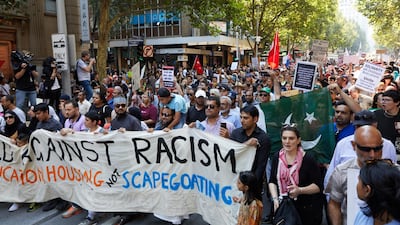The news that the prime suspect in a mass shooting at a mosque in New Zealand on Friday is Australian and comments by a fringe politician blaming the victims has sparked a fierce debate in the country over mainstream Islamophobia and concerns long raised by the Muslim community.
Fraser Anning, a vocal anti-immigration senator, released a statement after Friday’s attack, which left at least 49 dead in New Zealand’s Christchurch, in which he said the incident highlighted the “growing fear over an increasing Muslim presence” in Australia and Zealand communities.
In the letter, on Australian parliamentary letterhead, he added that the “real cause” of the shooting had been immigration programmes that “allowed Muslim fanatics to migrate to New Zealand in the first place.”
In response, politicians are making moves to censure Mr Anning in the Senate for his comments and senior figures – including Prime Minister Scott Morrison – have condemned the representative for the State of Queensland.

Speaking to media at Lakemba mosque in Sydney, the prime minister said the comments were “appalling and they’re ugly and they have no place in Australia. In the Parliament also. And he should be, frankly, ashamed of himself.”
Speaking to a Muslim community group in Melbourne, opposition leader Bill Shorten said he would urge Australians to stop giving “oxygen” to the “evil at the margins” who perpetuate hate speech.
He said Australians were feeling “impotent, outraged, disgusted and ashamed,” after the shootings.
But many prominent figures in Australia’s Muslim community have pointed out that Mr Anning is far from being an isolated case.
While opposition immigration spokesman in 2011, Mr Morrison urged the shadow cabinet to capitalise on the electorate’s growing concerns about “Muslim immigration”, “Muslims in Australia”, and the “inability” of Muslim migrants to “integrate”.
Mr Morrison’s comments came in a meeting after being asked to bring three ideas for issues on which the coalition should concentrate its political attack during the parliamentary term.
Mr Morrison’s comments were not unusual for an Australia politician.

Pauline Hanson, the founder and leader of Australia's One Nation party, previously compared Islam to a disease that Australians needed to vaccinate themselves against.
She has called for a ban on Muslim immigrants.
In 2017, Ms Hanson wore a burka during question time in the Australian Senate, a stunt to underscore her call to ban the garment, claiming it was a national security concern.
Prominent Australian-Egyptian television host Waleed Aly made a speech on The Project, a nightly current affairs chat show, saying he would be “dishonest” if he said he was shocked by the attacks in Christchurch. He went on to highlight creeping racism within the Australian political discourse.
“So, while I appreciate the words our leaders have said today – and in particular Scott Morrison’s comments and his preparedness to call this terrorism and the strength of his comments more generally – I have something to ask. Don’t change your tune now because the terrorism seems to be coming from a white supremacist. If you’ve been talking about being ‘tough on terrorism’ for years in the communities that allegedly support it, show us how tough you are now,” he said.
Mariam Veiszadeh, an Afghan-born Australian lawyer and anti-racist activist, has long used her Twitter account to document and discuss Islamophobia in Australia. In the wake of the shooting, she tweeted pictures of emails she received telling her – like Mr Anning’s comments – that the killings were the fault of Muslims.
She also said that she had told her mother not to visit a mosque in the coming weeks.
Australia does not gather hate crime statistics, but according to one of the biggest surveys conducted on racism, one in five Australians had experienced racism in the past year. It was commissioned by national broadcaster SBS in collaboration with the Western Sydney University.
On Saturday, in Melbourne, hundreds gathered for an anti-racism rally in Melbourne.
High School teacher Anam Javed spoke at the rally showing support for the Muslim communities in Christchurch but also talked about having been harassed in the supermarket for wearing a hijab and said she had seen many mosques vandalised.
In an anonymous letter published by The Guardian newspaper in the wake of the Christchurch attack, an Australian Muslim described her experience of abuse in stark terms.
“I am someone who has received death threats, been vilified through the tabloids, subjected to petitions to remove me from my employment and regularly received hate mail because I am Muslim, so perhaps the threats hit close to home.”

